MXA INTERVIEW: RICKY JOHNSON — THE ORIGINAL BAD BOY
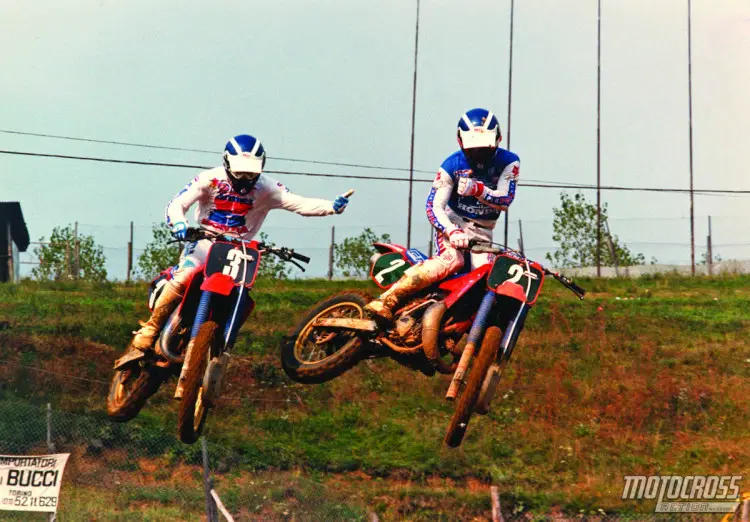
Ricky (2) and Johnny O’Mara (3).
WHERE DID YOUR LOVE OF MOTORCYCLES COME FROM? I started riding when I was 3 years old on a mini bike. My older sister had a Taco mini bike, which had a Briggs and Stratton engine in it. I always wanted to sit on it and pretend that I was riding. My father noticed my fascination with the bike. One day he was at Sears and he saw that they were selling a mini bike with a 1-1/2-horsepower engine. It had wings on the side so that I wouldn’t be able to tip it over. When I first started riding it, I would go up and down the street. It helped that I learned to ride a bicycle at 3 years old. From there, it was all about love. I found my true passion for dirt bikes from a very early age. I always wanted to get on my bike and go. I’d fall down, get hurt, cry and do it all over again. Sometimes I would get badly hurt, but I never thought about quitting. Instead, I thought about how to avoid getting hurt the next time.
DO YOU REMEMBER YOUR FIRST RACE? I was 7 years old, and it was around a flat track. Interestingly enough, I only did two races; when my friend moved away, I stopped. Two years went by without racing, but eventually I went out to a place called Four Corners, near Barona Oaks in California. I finished dead last; however, I wanted to go back. In three months, I moved up to the 9- to-11-year-old Expert class, and then I won the championship in Southern California.
AT THE AGE OF 12, I WANTED TO GET AWAY FROM MINI BIKES. THERE WAS TOO MUCH POLITICS IN MINI-BIKE RACING. IT SEEMED LIKE ALL THE FATHERS WANTED TO FIGHT ONE ANOTHER, AND THERE WAS ALSO CHEATING GOING ON.
WHY DID YOU MOVE UP TO THE BIG BIKES AT A YOUNG AGE? At the age of 12, I wanted to get away from mini bikes. There was too much politics in mini-bike racing. It seemed like all the fathers wanted to fight one another, and there was also cheating going on. Broc Glover was my neighbor growing up, and we became good friends. He let me ride his 125, and I liked it. In my first 125 race, I finished way back in the pack, but the bigger bike was cool because of the increased power and better suspension. My father said that I couldn’t race both the 80 and the 125 due to the cost. We decided to sell the 80 and concentrate only on the 125. Within three months, I went from Beginner to Professional. At 13, I raced Carlsbad, Saddleback, Escape Country and Indian Dunes. Then, at 16, I turned professional and raced the Nationals as a Yamaha support rider.
WHERE DID YOUR “TOO HIP” AND “BAD BOY” NICKNAMES COME FROM? “Too Hip” meant that I was too cool. I got that nickname from my mechanic at the time. The story behind it is that there was a radio DJ in California that would always say, “Too hip, I gotta go” before signing off the air. My mechanic liked that, so he called me “Too Hip.” Another nickname was “Bad Boy,” because I was part of the bad boy club.
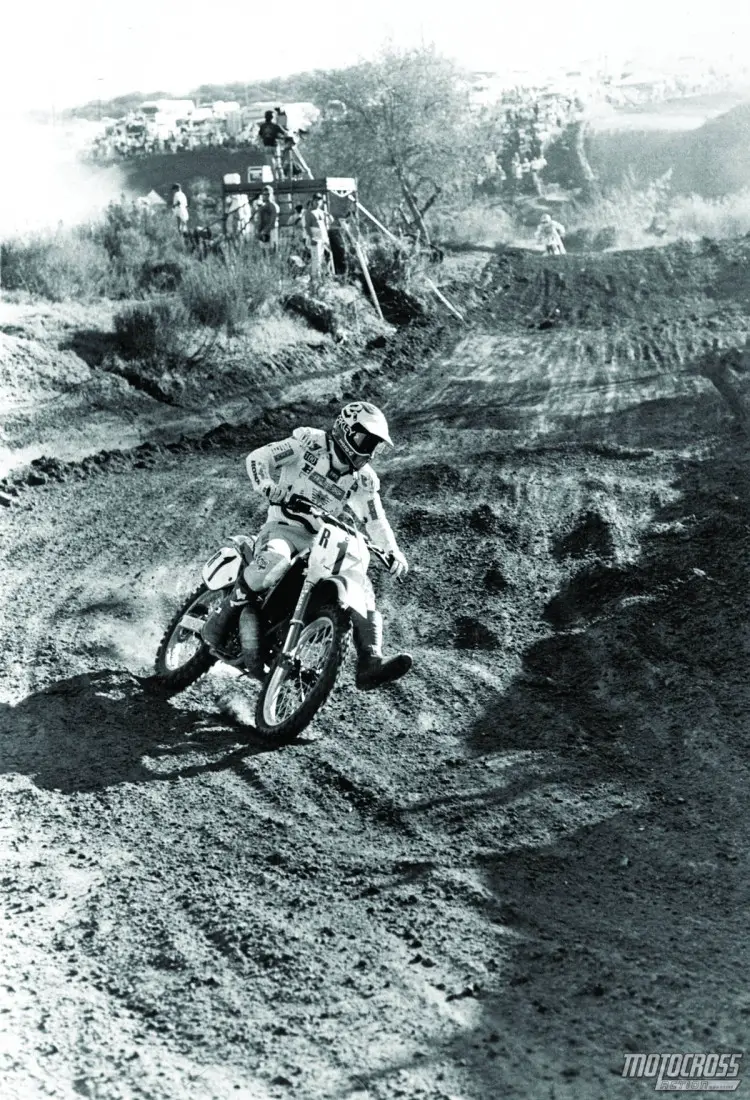
Ricky at a local race at his home track —Carlsbad.
HOW DID YOU BECOME A CHAMPION? There are several reasons. I owe a lot to Broc Glover, because he was a great example for me. Broc trained and worked very hard. Having someone that close to me, I saw what he did to be successful, and so I applied it to my own life. I did what Glover did, but I tried to be better than he was. He was there my whole career. As for my attitude, I got that from my parents. I always hated to lose. I’m a very bad loser [laughter]. I’m hard on myself and get emotional. I also loved the battles—whether it was with Jeff Ward, Ron Lechien, David Bailey, Dave Thorpe or Bob Hannah—I loved to race hard against them. Winning is good, but it’s the battle that really excites me.
WHAT IS THE BEST RACE BATTLE YOU’VE EVER BEEN IN? Obviously the races with David Bailey were memorable. People will recall the 1986 Anaheim Supercross, but the whole week before that race I was sick. My fitness wasn’t where it needed to be, so on the last couple of laps I had to submit. However, it was good for my motivation. That pushed me to keep moving forward. The most notable dogfight I had with David Bailey actually occurred at the 500 National in Axton, Virginia. That was his hometown track, and he had it wired. On that day I ate the roost off his rear wheel and he beat me, but I was right behind him the whole time. I had never felt so good after losing before. It was an accomplishment, because he didn’t make any mistakes all day long.
WHEN I RACED, WE HAD 45-MINUTE MOTOS. THE YOUNGER RIDERS KNEW THAT IF THEY COULD BE STRONG AND LAST, THEN THEY COULD BE BETTER. THAT’S WHEN GUYS LIKE JEFF WARD, JOHNNY O’MARA AND DAVID BAILEY WOULD DO MARATHONS AND TRIATHLONS.
WAS THERE EVER A BATTLE YOU HAD WITH ANOTHER RIDER THAT NO ONE EVER SAW? I had this battle with Jeff Ward and no one was there! We were both practicing for the AMA 500 Championship. I would go ride at this place that everyone called the flower track in Carlsbad. As I pulled in one day, I noticed that Jeff was geared up and pitting by himself. I looked at him, quickly put my gear on and jumped on the track as fast as I could. Jeff had just finished warming up, and we were half a track apart. The way the track was laid out, there was a spot where you went up a hill and down another hill. We could gauge our distance every lap. He would gain some on me and I’d gain some ground on him. We did that for almost an hour as fast as we could go. I wasn’t going to stop, because I didn’t want to submit. He actually ran out of gas. As he was pushing his bike back to the truck, I kept on riding. I saw him holding a stopwatch and taking down my lap times. I didn’t pull off until after he was gone, because I didn’t want to show any signs of weakness.
HOW DID RACING IN THE 1980s DIFFER FROM NOW? In the mid-1980s, there were a lot of riders who would get motivated if you passed them. Now? Everyone always says, “Back in the day…” It’s tough, because in the 1980s, the motorcycles were becoming better and better. In the 1970s, you couldn’t ride a bike wide open because you would break it. Joel Robert, Roger DeCoster, Torsten Hallman, John DeSoto and Brad Lackey could break their bikes in no time if they rode wide open all moto. They had to pace themselves. When I raced, we had 45-minute motos. The younger riders knew that if they could be strong and last, then they could be better. That’s when guys like Jeff Ward, Johnny O’Mara and David Bailey would do marathons and triathlons. Then there was a guy like Ron Lechien, who didn’t train so hard, but he was so naturally gifted. The Europeans were also trying new things to be the best. The 1980s were a time when a strong and aggressive rider could make it in the sport. Now, I only see a couple of guys that hammer down if they get passed on the track. I will say that the level of riders and mechanics is way better these days. The technology is so advanced. Take a look at the tires and suspension. In the old days, I would come into a corner and the wheel would flex. That doesn’t happen anymore.
RON LECHIEN AND BOB HANNAH MADE ME VERY ANGRY. HANNAH WAS SO ARROGANT, AND LECHIEN WAS DIRTY.
WHAT WAS YOUR BIGGEST STRENGTH AS A RACER? I was very skilled at braking. I could come into corners faster than anybody. I had good technique and also the ability to see lines as the track changed. I moved around and tried to keep my speed up. I can’t spell or read very well, but I can read terrain well! It just came naturally to me.
DID YOU HAVE ANY GLARING WEAKNESSES? I was easily distracted away from the track. There were the girls, but I also enjoyed surfing and having fun. My strength was my attention-deficit disorder, but it was also my greatest weakness.
WAS THERE ANY RIDER YOU DISLIKED? There’s a difference between anger and motivation. Jeff Ward and David Bailey motivated me the most. Ron Lechien and Bob Hannah made me very angry. Hannah was so arrogant, and Lechien was dirty. If Ron could break your leg, then he would try. That didn’t bother him. I had to learn to never give Ronnie that opportunity, because he would take advantage of it.
WHAT WAS THE BEST BIKE YOU EVER RODE? The bike that I liked the best was the one that I never got to race. Honda let me test Ron Lechien’s 1985 works CR250, and I told them that day I would sign with them. Then, in the blink of an eye, it was all gone. The AMA passed the production rule shortly thereafter. There couldn’t be works bikes in 1986. It was such a letdown, because that works Honda was magical. The power was unbelievable and smooth, the chassis was balanced, the suspension was so supple, and the light weight of the bike was ridiculous. All I had to do was adjust sag and I went four seconds a lap faster than on my practice bike.

Ricky in Paris starting next to Jeff Ward.
DID YOU HAVE A LEAST FAVORITE BIKE? I was never comfortable on the 1983 Yamaha works bike. It was very difficult to ride. That was the year I broke my collarbone and also dislocated my hip. The bike didn’t corner well. Sure, the bike was really light and looked cool. It had magnesium and aluminum, but it wasn’t rider-friendly.
WHAT WAS YOUR FAVORITE PART ABOUT BEING A RACER? The racing. I hated the moment before every race, because my nerves would go haywire. It always felt like I had to throw up. I was afraid of failure, and I hated that feeling. I didn’t want to let down my team, family, friends or sponsors. Then, as soon as the gate dropped, I felt amazing. The nerves went away, and I loved every minute of it.
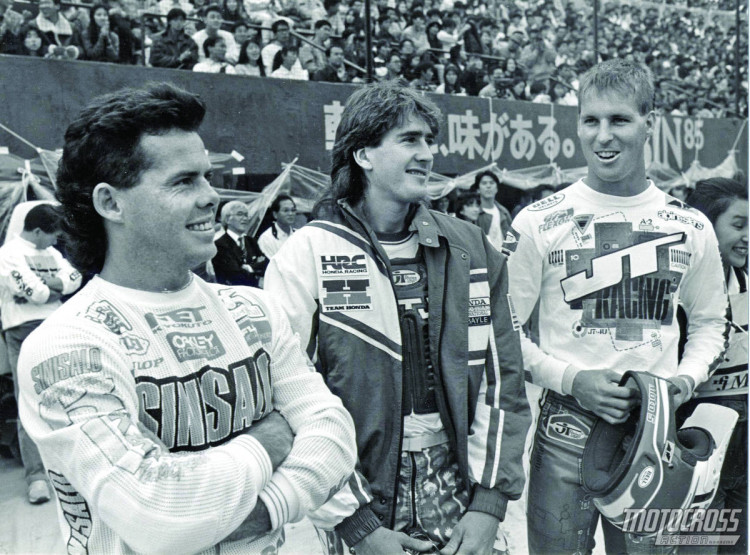
Jeff Ward, Jean-Michael Bayle and Ricky in Tokyo.
I RACED WITH THE BEST RACERS IN THE WORLD, AND SOME DAYS I BEAT THEM. THE MOTOCROSS DES NATIONS EVENTS REALLY STAND OUT.
WHAT WAS YOUR MOST MEMORABLE DAY AS A PRO? The one race that felt amazing was at Carlsbad in 1981. I won the last moto of the year, and I was a 125 privateer. It was my hometown track, so everyone was cheering for me. Crossing the finish line after winning my first professional moto was incredible. It made me realize that I deserved to be racing against the best. Even though I didn’t win the overall, I still won the moto. I caught and passed Johnny O’Mara, who won the first moto. No one can ever take that day away from me.
WHAT RACES DO YOU WISH THAT YOU COULD CHANGE THE OUTCOME OF? I was winning at Saddleback one year and I thought I saw the checkered flag, so I pulled off the track after I crossed the finish line. Everyone started yelling at me to get back on the track. It was the white flag! The other time I was racing with Jeff Ward on 80s. I had built up a lead, so I relaxed a bit, only Jeff caught and passed me in the last turn of the last lap. My father was crazy mad after that one!
WHAT ABOUT THE 1982 250 NATIONAL CHAMPIONSHIP FINALE? Yeah, that race hurt. I had a 20-point lead going into the last round of the championship in Castle Rock, Colorado. I went to pass Kenny Keylon in the first moto, and I jumped way too far. I landed and broke my wheel, so I had to push the bike to the pits. My mechanic changed the wheel, and I finished just out of the points in 21st. Donnie Hansen had the points lead going into the last moto. I had to beat Donnie and Broc Glover to win the National title. Glover took off and won the second moto, and I was in third place right behind Hansen. I tried to crash him, but he wouldn’t go down. We crossed the line in second and third. Donnie won the championship by two points. I was miserable. The whole 45-minute moto I couldn’t believe what was happening. That, by far, was the biggest mistake of my career.
WHAT WAS MOST SATISFYING ABOUT BEING A RACER? There are so many things. I raced with the best racers in the world, and some days I beat them. The Motocross des Nations events really stand out. Also, racing in Texas, where it was over 100 degrees outside, and passing Jeff Ward with two laps to go, was satisfying. Winning the Carlsbad USGP on ABC’s Wide World of Sports program for millions to see was awesome. There were a lot of great moments. And because of a great career, I’m fortunate to be recognized with those racers I hold in such high esteem.

Today Ricky is an offroad truck racer and event promoter.
WHAT KIND OF PAYCHECK DID YOU EARN AS A FACTORY RACER? When I started racing for factory Honda, I signed a contract for $125,000. Then it went up every year for the championships that I won. I was up to $350,000 a year for my Honda contract, from 1988 to 1989. That was a lot of money. I received a $100,000 bonus for every championship that I won. I’d also make extra money doing off-season and overseas races. One year I earned $100,000 in cash. Of course, that’s all gone now [laughter]. I bought a boat and a car and other things.
WHAT’S THE COOLEST PLACE YOU’VE EVER VISITED? I liked every place that I traveled to. I love Italy for a lot of reasons. The food is amazing, and the people are passionate. They don’t pull any punches. If an Italian person doesn’t like you, then you’ll know. If they like you, then they are very welcoming. I love Paris, because it’s so crazy and foreign to me, and also because of the history. I’ve enjoyed going to Belgium and Holland to see all of the castles. England was cool, because it’s like the light version of Europe. They speak English, and though it’s different, it’s not too different from what I’ve known. Japan has such deep history, and the fans are very polite. The fans in America wanted everything from me, but in Japan, the fans actually brought me gifts!
YOU MUST HAVE A LEAST FAVORITE PLACE? Every place had something unique. You have to keep an open mind. That’s what I learned from Broc Glover. You have to be willing to accept everybody’s traditions. The food can be tough. In Japan, they eat octopus on a stick, but that’s the cuisine. As they say, “When in Rome…” That has always been my mindset, and because of that, I’ve enjoyed almost all the places. If I had to pick a place, then I would say New York. When I raced in New York, I was a California guy on the East Coast, and sometimes the spectators wanted to fight me! There would be a big Ron Lechien or Jeff Ward fan, and they would scream obscenities at me. I’d get upset if someone didn’t like me, so it was hard to understand why someone hated me even though they didn’t know me. Now I do like New York City.
SURELY YOU HAVE A FUNNY RENTAL-CAR STORY. Broc Glover was one of the best rental-car drivers I’ve ever known. My best rental-car story actually happened on vacation and not at the track. I was in Mexico with Brian Simo, the owner of No Fear, and we rented a Volkswagen Bug to go surfing. We were looking for a special road so that we could get to the ocean. We found the road but didn’t realize that there was a bend at one point. A river had come through and washed part of the road out. I was driving wide open and saw the drop-off at the last second. I slammed on the brakes, but it didn’t help. So I hit the gas, but that didn’t do anything. We went flying about 60 feet out and fell 5 feet. The crash caved in the roof and broke the engine in two. We got the car out of the ravine and continued to drive it, but every time we stopped, the engine oil came pouring out. We went through three cases of oil to get through the trip. Needless to say, the rental car people weren’t happy with us.
WHY DID YOU HAVE SO MUCH SUCCESS WITH HONDA? I was fast and aggressive at Yamaha, but the manufacturer was going through a transitional time. When I got to Honda, I worked with Roger DeCoster, Dave Arnold, Brian Lunnis, and Showa’s Jim Anderson. I could talk to them, and they would make me better. The series that sticks out is the 1986 Supercross Championship. I had a lot of good battles with Jeff Ward and David Bailey, but we persevered. I won other titles, but that one was a big deal.
I DON’T BELIEVE THAT RICKY CARMICHAEL IS THE GREATEST OF ALL TIME. HE IS AWESOME. HE IS A GREAT CHAMPION. BUT TO SAY THAT HE’S THE BEST OF ALL TIME? I DON’T THINK THAT HE WOULD HAVE SURVIVED HAD HE RACED IN AN EARLIER ERA.
WHAT WAS IT LIKE BEING ON THE POWERHOUSE FACTORY HONDA TEAM? It was good and scary at the same time. I knew that I was on the best team. They gave me everything I needed to win. Having said that, I knew that I had to be the best. Finishing anywhere other than first place simply wasn’t an option. I had to win. I loved the feeling of having to be the best, but at times it was lonely. There was a bit of isolation involved, because I focused so much on winning. That intensity didn’t stop once I was at the top. I had to keep pushing, because my competition wasn’t rolling over and dying. They wanted to be the best, and so they got better. In turn, I had to become better. It was stressful. Then again, I was paid a lot of money to withstand the pressure.
WHERE DO YOU RANK YOURSELF ON THE LIST OF ALL-TIME GREATS? That’s a tough question to answer. It all depends on how you measure greatness. For me, you can’t just measure greatness based on duration. The day that Jeff Ward won the Motocross des Nations in Sweden in 1984, everyone that was there still talks about how perfectly he rode that day. I had days, such as Daytona or Seattle, where I felt out of body. Everything felt amazing. No one was going to touch me. To be in the top 10 is great, but I know that I would take on anybody from any time when I was in my prime and healthy. For me, if I’m considered one of the 10 best, then I’m happy.
WHO WOULD YOU LIKE TO LINE UP TO THE GATE WITH? I would take on Ricky Carmichael, James Stewart, Ryan Villopoto, Roger DeCoster, Joel Robert—it doesn’t matter. Maybe I would have to ride dirty. Maybe I’d have to be smart and smooth. Take Jean-Michel Bayle, for example. He was so much faster than I was, but he wasn’t stronger. He also didn’t have as big of a heart. At Unadilla, he would be gapping me in the early laps, but then I’d reel him in. Every rider is different. At times I would try to get in the minds of my competition during practice. Maybe it would be during the week. Maybe I would talk about a certain rider in the media and try to upset him that way. That was Jimmy Weinert’s style. I left other riders alone. I would be nice to them in the pits but crush them on the track.
WHO IS THE GREATEST OF ALL TIME? I don’t believe that Ricky Carmichael is the greatest of all time. He is awesome. He is a great champion. But to say that he’s the best of all time? I don’t think that he would have survived had he raced in an earlier era. He was too small. He could not ride in the 1960s with Roger DeCoster and Joel Robert, because his style would have broken the bike. He would have been injured. Yes, he’s the greatest of his time, but not all time. I’m not saying that I’m better, but to put that label on him isn’t quite right with me.
THE BEST RIDER EVER, AT LEAST IN TERMS OF TECHNIQUE AND SPEED, IS JAMES STEWART. HE’S NOT VERY SMART AND HE CRASHES A LOT, BUT WHEN HE DOES IT RIGHT, HE DOES THINGS THAT MAKE ME SCRATCH MY HEAD.
SO WHO IS THE BEST? The best rider ever, at least in terms of technique and speed, is James Stewart. He’s not very smart and he crashes a lot, but when he does it right, he does things that make me scratch my head. I could always figure out what Broc Glover was doing on the bike. The same with Ryan Villopoto and Ryan Dungey. Then you watch Stewart and you go, “Where did that come from?” But, he needs to learn to pull back. There’s no rule that says that you have to win the race by 10 minutes.
DO YOU EVER THINK ABOUT WHAT WOULD HAVE BEEN IF YOU HADN’T BROKEN YOUR WRIST? Yes, I have thought about it. Sometimes I think that it was a blessing. I also think about the record books and about how much more money I would have made. I would have won a lot more races. But then I look at the way my life is today. I married a beautiful woman, and that’s because the injury forced me to open up to a person. When I was racing, I wouldn’t let people in. Once I got injured I broke down, and my wife saw a side of me that no one else saw. In turn, we had kids at a younger age. Financially, it would have been better had I not broken my wrist. Yet, would I go back and change it? I wouldn’t change a thing. A lot of people only look at wins, records and money. That’s not how a rider’s career should be measured.
WHAT WOULD YOU CHANGE ABOUT SUPERCROSS? First, I would bring back 250 two-strokes. The racing was much better with two-strokes. A 250 makes more than enough power. It’s cheaper to work on, and more people would buy them. The racing was better because there was inside passing and fewer one-line tracks. If I were going to keep four-strokes, then I would bring down the displacement. I would have a 250cc class, two-stroke or four-stroke. I asked Ricky Carmichael to have everyone race 250s for the Monster Cup. That would be something.
ANYTHING ELSE ON THE WISH LIST FOR SUPERCROSS? I’d like to see a competition yellow flag, which is used in truck racing. That would keep the racing tighter. On lap 12, I would have the racers stop, line them up and drop the green flag again. That way, if a rider fell in the first turn, he could work his way up to third. Then, at the mandated yellow, the gap would be closed and he could have the opportunity to win. That would make the racing unbelievable.
WHAT ARE THEY DOING TO MAKE THIS SPORT BETTER FOR THE NEXT GENERATION? SURE, THEY WIN AND THEY TRAIN HARD, BUT WHAT ELSE? EVERYTHING IS ABOUT THEM!
IS IT BAFFLING TO SEE HOW FAR THE SPORT HAS COME SINCE ITS INCEPTION? It is not baffling to me. It’s surprising that it’s not further than it is. Where it’s at now is good, but it should be better. It would be better if the riders cared more about the sport than themselves. Many of the racers might not like what I have to say, but it is their job to make the sport a better place for the next generation. Roger DeCoster, Torsten Hallman, Joel Robert and Brad Lackey worked hard to make motocross a better place so that guys like Danny LaPorte and I could have a better living. The sport started with riders in the backs of vans. It wasn’t about the money. They were good spokesmen and represented their sport. Now a lot of these racers think that they are superstars.
ISN’T THAT JUST PART OF THE NEW GENERATION? Don’t get me wrong, there are some good kids, but what are they doing to make this sport better for the next generation? Sure, they win and they train hard, but what else? Everything is about them. They should branch out and show everyone that motocross racers are great athletes and also good people. Instead, they ride, train, race, sleep and eat. That’s it. The riders need to work harder. They aren’t taking the responsibility of being a champion. I wish that they would share who they are as people instead of acting like robots.
DO YOU REMEMBER EVERY SINGLE ONE OF YOUR 250 NATIONAL WINS? No. If I sat and thought about it, or I saw a picture, then I could remember it. To go down the list is like remembering a song. I don’t exactly remember all of the words, but if I hear the song, then it will come back to me. Believe it or not, I try not to live in the past. I’m not Ricky Johnson the racer. Now I’m Luke, Jake and Cassidy’s dad, and I’m also Stephanie’s husband. I don’t believe the hype. I’m a guy who raced fast and made money in the 1980s. Now I have to work hard to pay my taxes because my president is messing up the government [laughter].
WHAT WAS THE COOLEST THING YOU’VE EVER DONE ON A MOTOCROSS BIKE? When I was 8 years old, I was following a friend on a bike, and he said, “Whatever you do, you better not stop.” We were riding along, and we rode across a golf course. The grass was so smooth, and I was having the time of my life, but people started hitting golf balls at us! That was very cool.
WHAT DOES IT TAKE TO BE A CHAMPION? You must have the ability to adapt. If you get a bad start, then you make the best of it. If your bike makes a noise or breaks, then you survive. When you have a bad day, you get fifth. When you have a good day, then you destroy everyone. You must also be able to endure pain. It could be the small pain from running to train or getting roosted and breaking fingers. It could be worse pain, but still you forge ahead and race for the championship.
WHO DO YOU THINK OF RYAN DUNGEY’S APPROACH TO RACING? Ryan Dungey reminds me of David Bailey. He’s so smooth, and he doesn’t make very many mistakes. He also has the conditioning, but he needs to get a little closer to the edge.
WHERE HAVE MOTORCYCLES TAKEN YOU? It’s crazy to think about! From being a little boy riding motorcycles up and down the street, I’ve met President Ronald Reagan in the White House. I’ve met Soichiro Honda. I’ve been all around the world. I’ve made such good friends that I now consider them family. All of this happened because I raced a motorcycle. I’ve lived the dream, and I couldn’t be happier. ❏


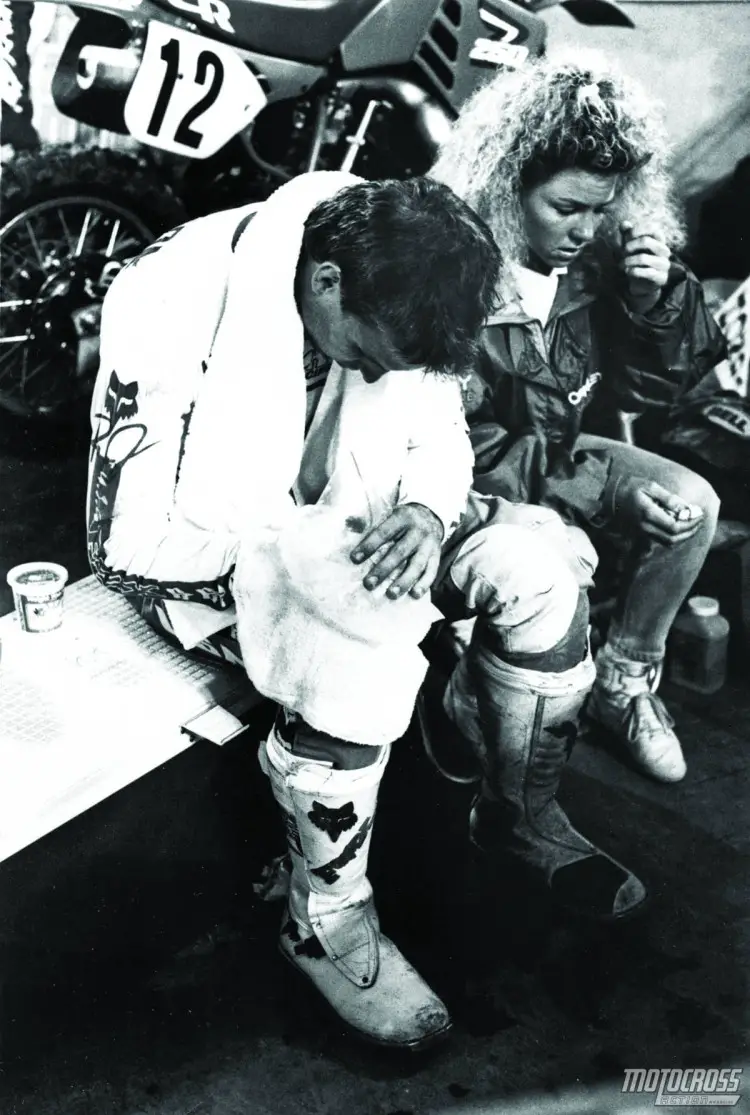
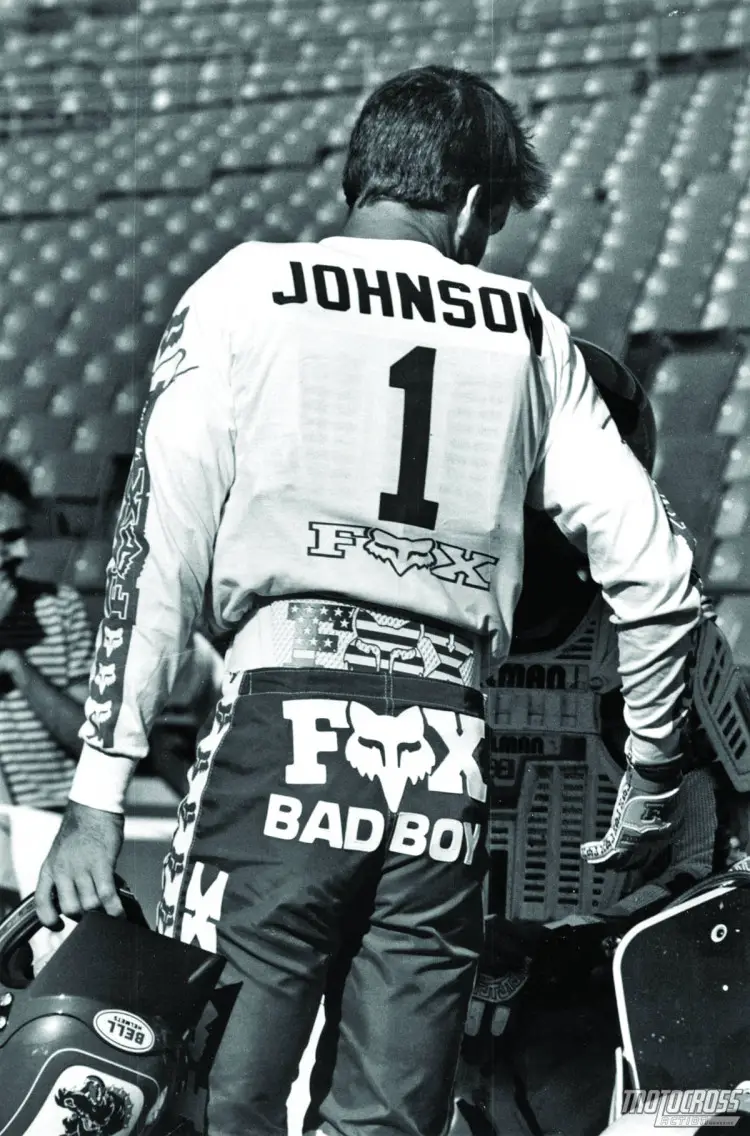
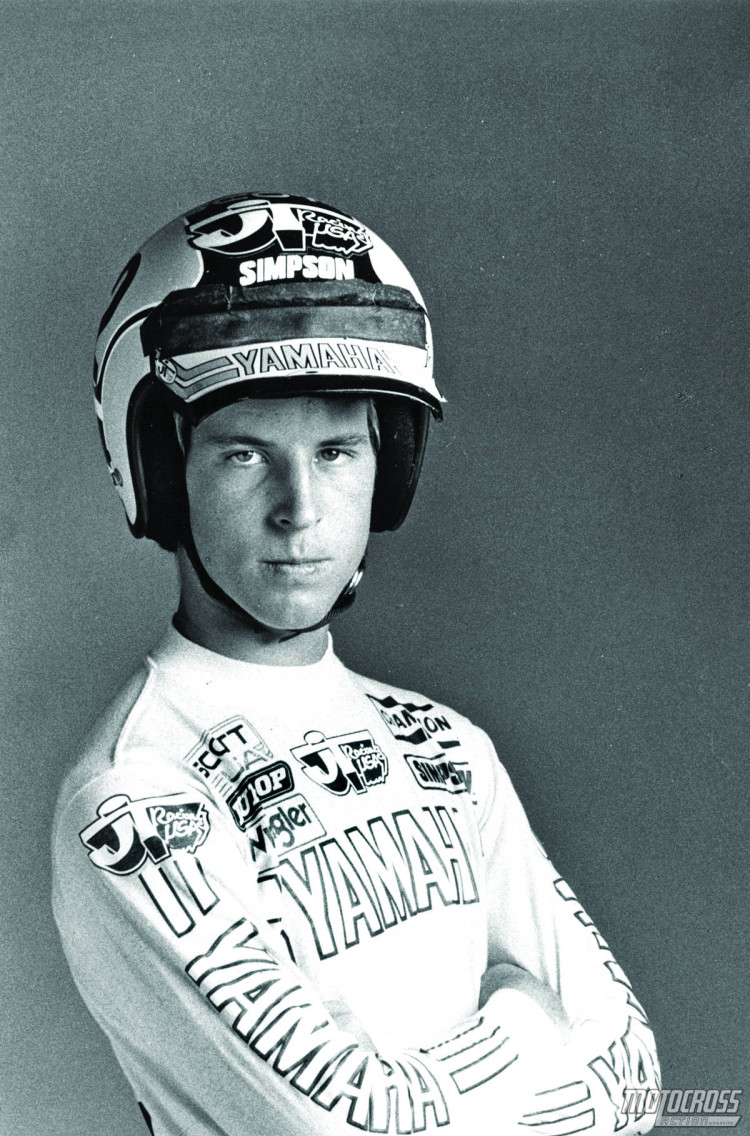
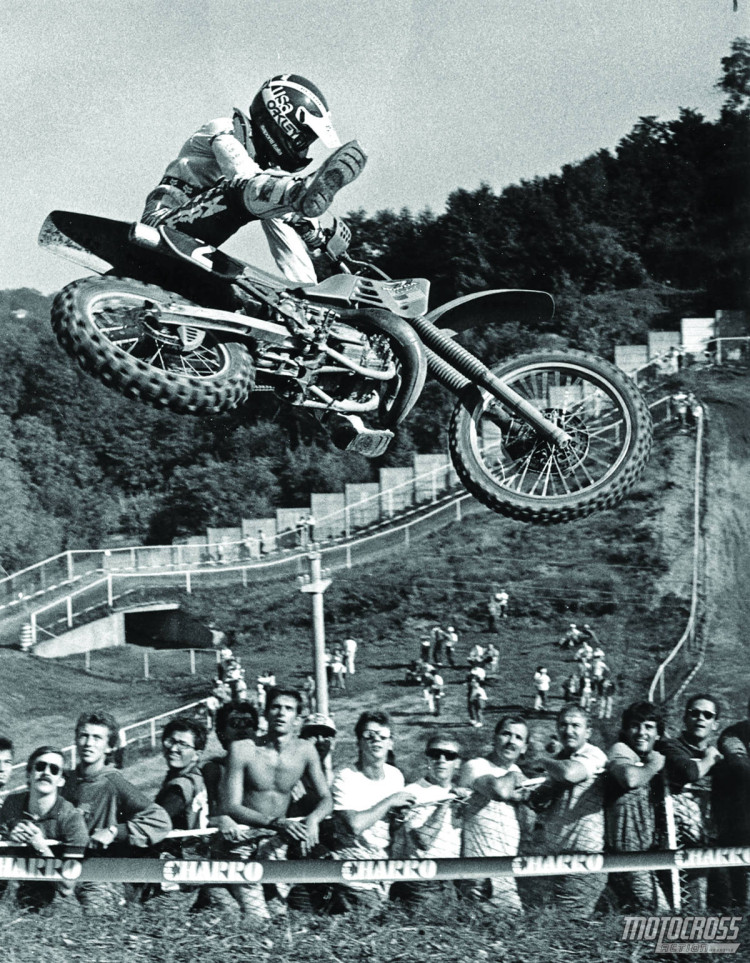
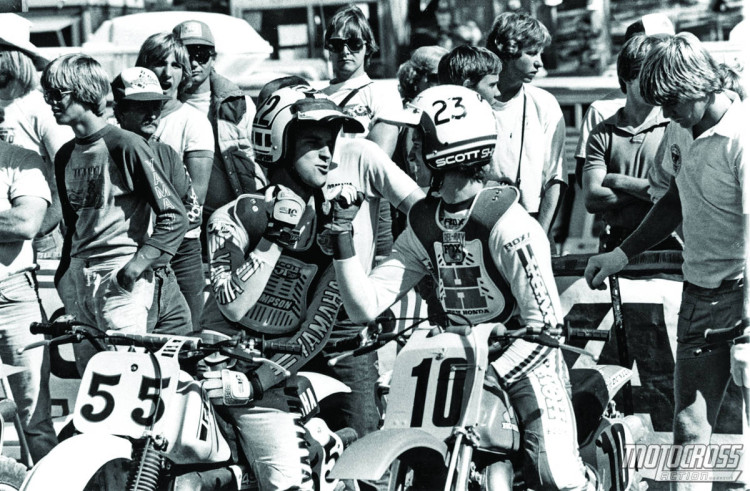
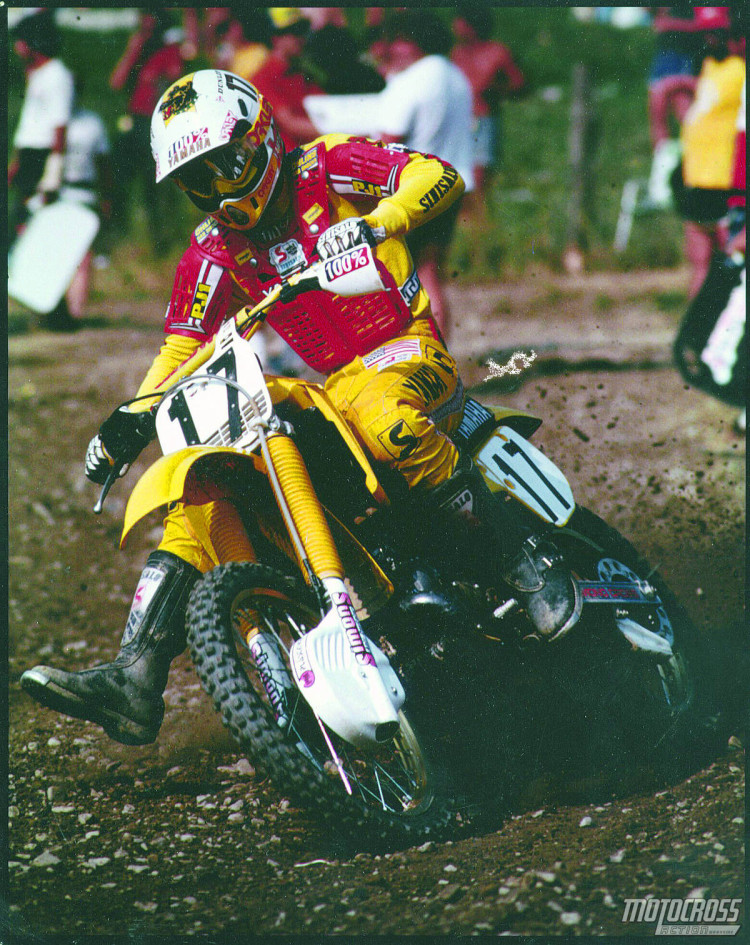
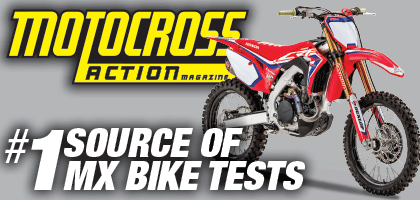


Comments are closed.